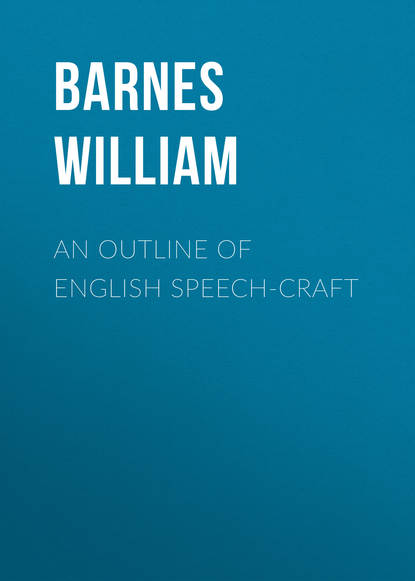По всем вопросам обращайтесь на: info@litportal.ru
(©) 2003-2024.
✖
An Outline of English Speech-craft
Настройки чтения
Размер шрифта
Высота строк
Поля
Prototype. Foreshape, forepattern.
Punctuation. L. punctuatio, from puncta, points or stops. The skill of the putting of stops, or of the marking of voice-stoppings in speech. Bestopping. (See ‘Period (#Period).’)
Radicle. Rootling.
Reciprocal (verb). L. re, back, fro; ci, to this way. To and fro verbs; as, ‘They helped each other.’
Rectify. Righten.
Reflective. Back-turning, as a time-taking which comes back to the source of it; as, ‘John cut or hit himself.’
Regimen. Government, overwielding of a thing by another.
Religion. Faith-law.
Religious. On the true meaning of religiosus see Aul. Gell. Noct. Att. iv. 9. He makes it mean withholden, backbound from some uses. Religiosa delubra, a shrine hallowed from common use; religiosus dies, a day withholden, as unlucky, from great undertakings. A religious man is one who is withholden by his faith and conscience from bad deeds.
Restrain. Inhold, forhold.
Result. Outcome, outworking, backspring. Result (from resilio, to spring back) is neither in sound nor meaning a better word than outcome or outworking or froming, fromming.
Rhetoric. Rede-speech.
Rhythm. Gr. rhythmos, number, as number of clippings or sounds in a line of verse. Metre, which meant at first tale of sounds rather than sound matching, which we call rime. Rime is not come to us from the Greek, but is the Saxon rim or hrim, tale or number.
‘Manâ and misdædâ ungerím ealrâ’ (a tale, beyond telling, of all wickednesses and misdeeds). —Sermo Lupi ad Anglos.
‘Deer naet in da rime was’ (who was not in the number). —Old Friesic Law.
Salubrious. Healthy, halesome.
Satellite. Henchman.
Scintillate. Sparkle.
Semi-detached houses. Twin-houses, a house-twin.
Sentence. L. sentio, to think, deem, feel. In speech-craft, an uttering of a thought, one thought-wording.
Septuple. Sevenfold.
-sh (an ending). It means quickness and smartness; as, clang, clash; crack, crash; fly, flash; go, gush; hack, hash. In markwords it means somewhat such; —blackish, boyish.
-ship (an ending). It means a shape or form of being: —Friendship, mateship.
Solœcisms. Gr. soloikismos, from the bad Greek of the Soloikoi in Cilicia. A miswording, barbarism, or, as an old Saxon gives it, ‘a miscweðen word,’ or a misquothing, a misqueathing.
We in a solœcismus find
Miswording of a loreless mind.
Solstice. Sunsted. A.S. Sunanstede.
-some. The ending -some in such words as aimsome, matchsome, yieldsome seems, as we look to its true first meaning, to be a fitting one. A sam or som (some) meant at first a body of mingled matter or things. In its stronger meaning lumps of suet melted up into a soft body would be a sam or som; and potatoes boiled and mashed up would be a sam; and dough, if not flour itself, is a sam or som.
In the wider meaning of the word an upgathering of things, and even men, into a body or set is a sam or som. Thence we have our word same as well as the ending -some and the markword some: – ‘Some in rags, and some in jags, and some in silken gowns’ (a set or body in rags, a set or body in jags, &c.).
Aimsome, yieldsome would mean of the aim or yield or aiming or yielding set or body.
Sam or som gives our words same and so. ‘The same man’ means the very man in sam or body or being. ‘Are they Hebrews? so (same) am I.’ Of that sam (am I). The Latin se is most likely a word of the same root: – ‘Lucius se amat’ (Lucius loves same or his sam); and this is the meaning of our word self.
The Latin similis would mean of the sam or same kind; and ‘to summon (samen) men’ is to call them up into a sam, ‘Suma êlanda thêr im likte’ (some islands that pleased him). —Oera Linda Book.
Sophist. Wordwise.
Sophistry. Rede-guile, rede-cunning.
Spell. Sax. spellian, to tell, utter forth a word or a set of words.
Spell. A message or bewording, as in Godspel (Gospel), ‘the good message.’
-st (an ending). It strengthens the meaning, as it does in blackest; blow, blast; brow, breast.
Stereography. Bulk-drawing.
Stereometry. Bulk-meting.
Stereotype. Block-type.
Subject. The speech-thing or thing under speech.
Subjunctive (mood). The hinge-mood; as, ‘If ye ask, ye shall receive.’
Suffix. A wordling put on at the end of a word; as, man-hood, good-ness, kind-ly. End-eking, an on-eking, a word-ending.
Superlative. The highest pitch.
Supposititious. Underfoisted, undersmuggled.
Syllepsis. Gr. syn, up, together; lēpsis, a taking. An uptaking, upmating, comprehension, as of a second or third person with a first; as, ‘I (1) and my brother (3) (we) learn Latin.’.
Syllepsis takes I, you, and he
As first persons, and all called we.
Synalœpha. Gr. syn, up; aleipho, to smear. Sound-welding. The welding up of two sounds into one, or the end of one word into the head of the following. In Latin verse – ‘Conticuere omnes,’ ‘conticue͞r omnes,’ ‘conticuere◡omnes’ – uttering the e and om in the time of one syllable. So in Italian – ‘In prato◡in foresta,’ ‘Sia l’alba◡o la sera,’ ‘Se dorme◡il pastor’ – the o i, and a o, and e i are uttered as one syllable. In English – ‘Before the◡Almighty’s throne.’
By synalœpha breath-sounds run
A couple to the time of one.





